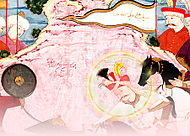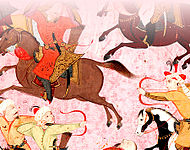Certain accursed ones of no significance
- Certain accursed ones of no significance
-
'Certain accursed ones of no significance' is the term used by Taş Köprü Zade in the Şakaiki Numaniye to describe some Hurufis who became intimate with the Sultan Mehmed II to the extent of initiating him as a follower.
This alarmed members of the Ulema, particularly Mahmut Paşa, who then consulted Mevlana Fahreddin. Fahreddin hid in the Sultan's palace and heard the Hurufis propound their doctrines. Considering these heretical, he reviled them with curses. The Hurufis fled to the Sultan, but Fahreddin's denunciation of them was so virulent that Mehmed II was unable to defend them. Farhreddin then took them in front of the Üç Şerefeli Mosque, Edirne, where he publicly condemned them to death. While preparing the fire for their execution, Fahreddin accidentally set fire to his beard. However the Hurufis were burnt to death.
According to Bektashi tradition, Ali Ul 'Ali was one of the 'Certain accursed ones of no significance'
References
- The Bektashi Order of Dervishes by John Kingsley Birge, 1982 (p 60 - 62)
Wikimedia Foundation.
2010.
Look at other dictionaries:
Edirne — Adrianopolis redirects here. For other uses, see Adrianopolis (disambiguation). Adrianople redirects here. For the Battle of Adrianople, see Battle of Adrianople. For the Treaty of Adrianople, see Treaty of Adrianople. Edirne… … Wikipedia
ANTISEMITISM — ANTISEMITISM, a term coined in 1879, from the Greek ἁντί = anti, and Σημ = Semite by the German agitator wilhelm marr to designate the then current anti Jewish campaigns in Europe. Antisemitism soon came into general use as a term denoting all… … Encyclopedia of Judaism
ANGELS AND ANGELOLOGY — ANGELS AND ANGELOLOGY. The entry is arranged according to the following outline: bible terminology angels as a group the angel of the lord in the hagiographa silence of the prophets ezekiel and zechariah daniel apocrypha among the jewish sects… … Encyclopedia of Judaism
ancient Rome — ▪ ancient state, Europe, Africa, and Asia Introduction the state centred on the city of Rome. This article discusses the period from the founding of the city and the regal period, which began in 753 BC, through the events leading to the… … Universalium
CHRISTIANITY — CHRISTIANITY, a general term denoting the historic community deriving from the original followers of Jesus of Nazareth; the institutions, social and cultural patterns, and the beliefs and doctrines evolved by this community; and – in the widest … Encyclopedia of Judaism
Glossary of ancient Roman religion — This is an incomplete list, which may never be able to satisfy particular standards for completeness. You can help by expanding it with reliably sourced entries. Ancient Roman religion … Wikipedia
Apostasy in Christianity — Judas betrays Jesus with a kiss. Judas Iscariot, one of the Twelve Apostles, became an apostate.[1] Apostasy in Christianity refers to the rejection of Christianity by someone who formerly was a Christian. The term apostasy comes from the Greek… … Wikipedia
Demonology — • The science or doctrine concerning demons Catholic Encyclopedia. Kevin Knight. 2006. Demonology Demonology † … Catholic encyclopedia
Aleksey Konstantinovich Tolstoy — Not to be confused with Aleksey Nikolayevich Tolstoy. Aleksey Konstantinovich Tolstoy Aleksey Konstantinovich Tolstoy by Karl Brullov Born September 5 [O.S. August 24] 1817 Saint Petersburg … Wikipedia
Jonathan Strange & Mr Norrell — … Wikipedia


